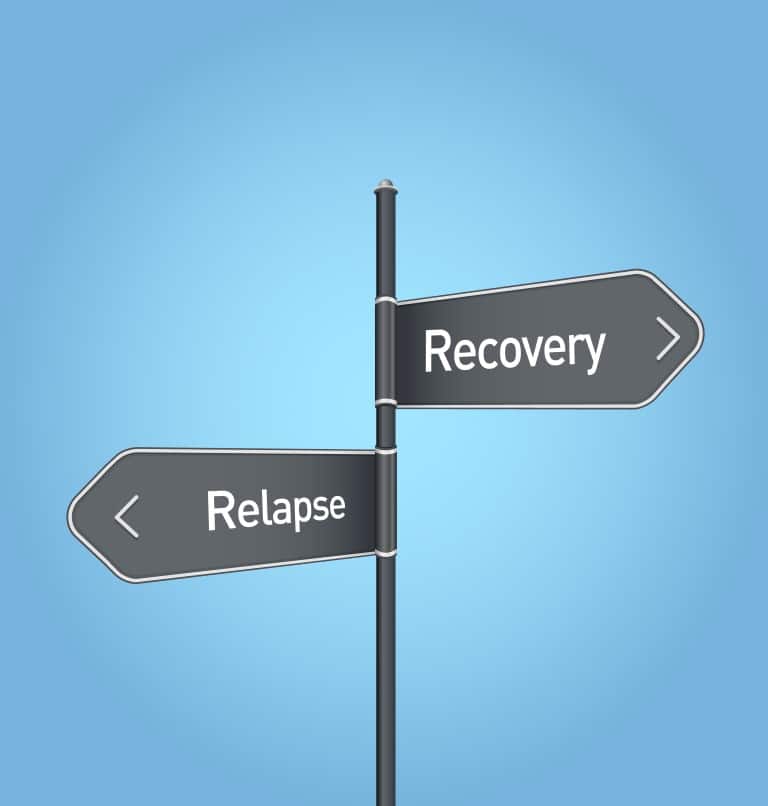Understanding Relapse: Why It Happens, How You Can Prevent It
Every addict has to worry about the dreaded R word– relapse. Addiction is a disease, and just like any other disease, your symptoms will return if you don’t take care of yourself and stick with a long-term sobriety plan. Research suggests that relapse rates for addiction are similar to the relapse rates associated with other medical conditions. For example, addicts relapse at a rate of 40% to 60%, while recovering diabetics have a relapse rate of 30% to 50%, and both hypertension and asthma have relapse rates of 50% to 70%. Worrying endlessly about relapse won’t save you, but understanding relapse and developing a clear plan for avoiding it can. From the moment you embark on your drug and alcohol treatment journey, you need to actively work to reduce your risk of relapsing.
Why Addicts Relapse
Ultimately, addicts relapse because giving up drugs and alcohol is extremely difficult. In the popular media, recovery is often portrayed as a one-time thing – something you do once when you go to rehab, but never again. The reality is that recovery is something you must re-commit to every day, particularly in the early months of sobriety. Forgetting this, or forgetting that you have a chronic illness, can lead you to relapse. You’re at the greatest risk of relapse when:
- You experience new life events, such as Christmas, a fight with your spouse, a death in your family, or moving for the first time without alcohol or drugs.
- You’re under stress, whether positive or negative. Both the loss of a job you loved and promotion can cause you to relapse.
- You’re around triggers for drug and alcohol use. For example, if you meet up with a friend with whom you used to do drugs, you’re at high risk of relapse.
- You’re in the first days of recovery. The majority of relapses occur when addicts are still undergoing withdrawal. Thereafter, your risk of relapse steadily declines.
- You use drugs or alcohol. Using the substance to which you were previously addicted poses the greatest risk of relapse, but any substance abuse puts you in danger. Addiction is a disease, and it doesn’t discriminate in favor of a specific substance. An alcoholic can easily become a shopping addict or a heroin abuser.
Relapse as Part of Recovery
Because relapse is so common, many drug treatment professionals argue that relapse is actually a normal part of the recovery process. This is good news, particularly if you’ve already relapsed or are worried about relapsing. Research suggests that with each relapse, an addict’s likelihood of long-term sobriety doesn’t decrease; it increases! Most addicts relapse anywhere between two and six times before recovery finally sticks. So why does relapse have the potential to help you recover? There are myriad reasons:
- For some addicts, relapsing is the only thing that causes them to take their addiction seriously and begin treating it like a chronic illness.
- When you relapse, you gain insight into which triggers for use are most challenging for you to face.
- A relapse can spur you to seek better addiction treatment than you previously received.
- When you relapse, you may develop negative associations with the drug, helping you avoid idealizing it.
- The skills you learned as part of your recovery before you relapsed can still help you with your next recovery.
- Even though you’ve relapsed, you’ve learned much about the recovery journey, and will not be so overwhelmed with sudden surprise stressors the next time you try to quit.
Preventing Relapse
Relapse might be a normal part of recovery, but it’s certainly no walk in the park. You may be plagued by feelings of shame and guilt, feel judged by those who supported you, and feel overwhelmed by the prospect of yet again working to get sober. Consequently, your treatment program should include a contingency plan designed to help you avoid relapsing. Some things to consider including in your plan include:
- A detailed list of your triggers for use. Every time you experience one of these triggers without using, offer yourself a small reward.
- A list of the life experiences you have not yet faced without drugs. The first time you go through these normal activities – such as driving sober or Christmas shopping without drugs – try taking someone with you as a source of support. And every time you try something new without drugs or alcohol, reward yourself.
- A detailed list of alternatives to using drugs or alcohol. List favorite hobbies, activities that have always lifted you out of a bad mood, and ways to pass the time. For example, taking 10 minutes to meditate may be all you need to do to ride out a craving.
- A list of people you can reach out to when you’re experiencing a severe craving.
- A “reward” system. Plan to reward yourself at major recovery milestones – one week, one month, six months, etc.
- A list of each and every reason you are quitting drugs. Plan on turning to these reasons when a craving becomes overwhelming.
The journey toward sobriety is a long one that requires constant vigilance and plenty of support. If you do relapse, you’re not alone. Help is available. Just know that your relapse is teaching you important lessons about what you can do to increase your odds of successfully becoming sober next time.


